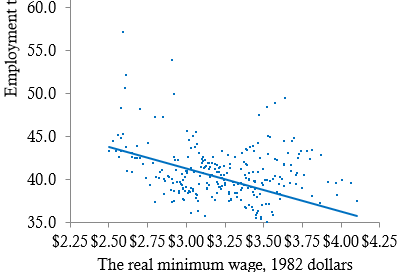Thirty years ago the late Alan Krueger and David Card published their famous New Jersey minimum wage study. Card and Krueger succeeded in refocusing our attention. Prior to the Card/Krueger study economists and the public focused on how minimum wages raise the rate of unemployment. Card and Krueger argued that increasing the legal minimum wage may not inhibit increases in employment.
Many people see the Card/Krueger study as definitive, but it has serious deficiencies. The Card/Krueger study is narrowly focused and lacks proper statistical controls1. The Card/Krueger study uses phone survey data from fast food restaurants, to focus on teen employment. Their emphasis on teenage employment is appropriate, because many economists have long argued that minimum wages primarily affect teenage workers. However, there are many other industries that employ mostly younger workers. The Card/Krueger study is also focused on a brief time period, just before and shortly after one increase in the New Jersey minimum wage.
What do larger data sets tell us about the effects of minimum wages on employment? The following graph depicts the relation between the employment to population ratio of the entire United States and the minimum wage, from 1950 to 2022.
The blue line just above is the line of best fit for 16 to 19 year old Americans. If the real value of the minimum wage falls to about 2 1/2 dollars the teen employment to population ratio rises to almost 45. If the real value of the minimum wage exceeds $4 the employment of population ratio for teenagers falls to almost 35. The purple line just above is the line of best fit for 25-54 year old employment and minimum wages. Changes in legal minimum wage rates have no significant effect on employment for 25-54 year old workers.
Alan Krueger thought that it is too hard to isolate effects of minimum wages in time series data2. My analysis of time series data indicates that raising the minimum wage kills jobs and limits employment for teens3. What should we conclude from this data? At the very least, teenagers should be exempted from minimum wage laws. Better still, minimum wage laws should be repealed entirely.
David Card’s co-recipient of the Nobel Prize in economics has explained how employment data from Pennsylvania does not serve as a proper statistical control for NJ. I raised this issue here.
To quote Dr. Krueger “I never put much stock in the time-series evidence. There are too many things that change over time to believe that the time-series studies truly isolated the effect of the minimum wage”. History of Thought on the Minimum Wage p535.
My most recent estimates the statistical significance of effects of real minimum wages on unemployment and teen employment are P-values of 1.93 E-09 and .000777, respectively.



